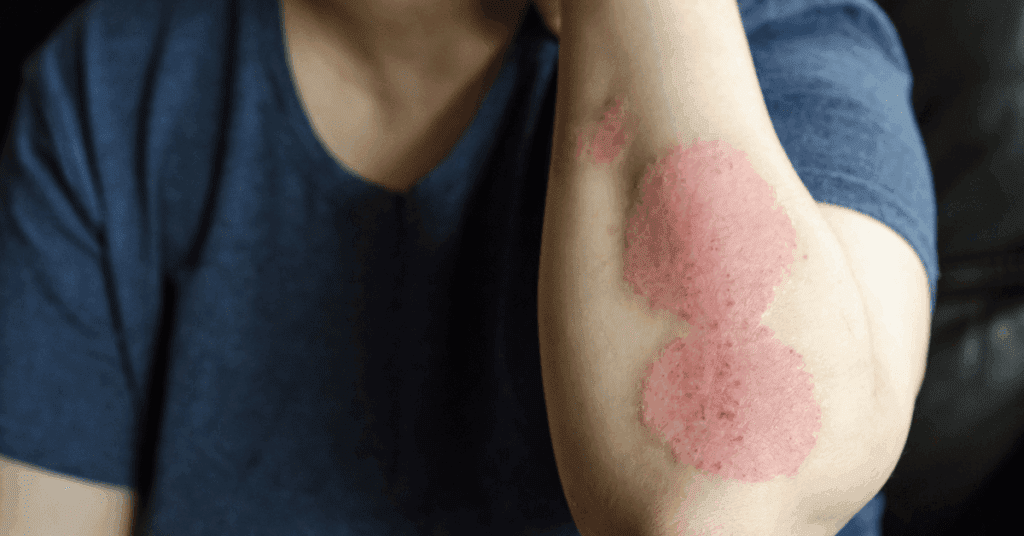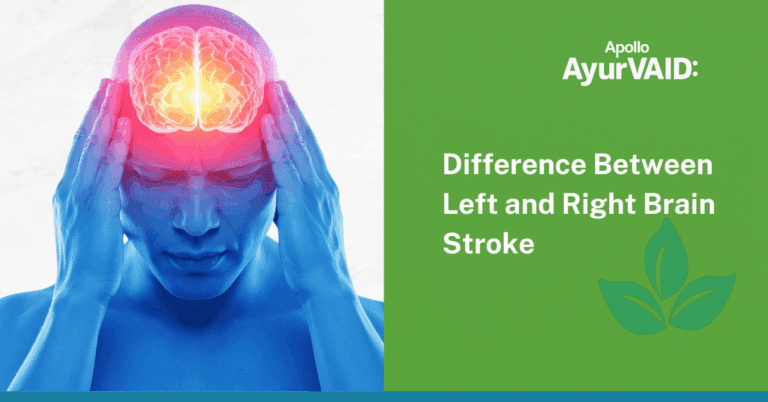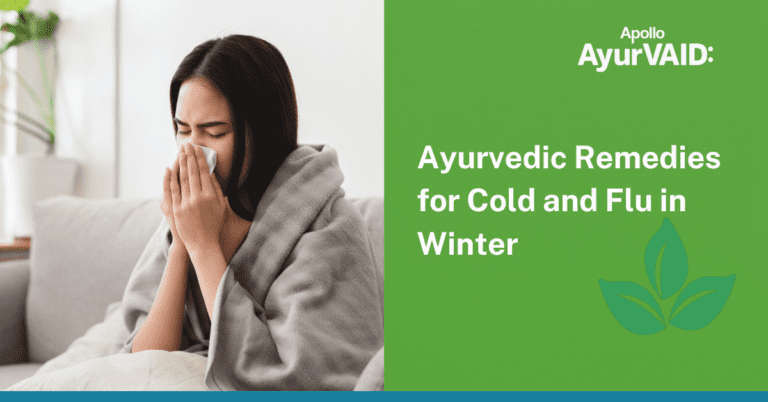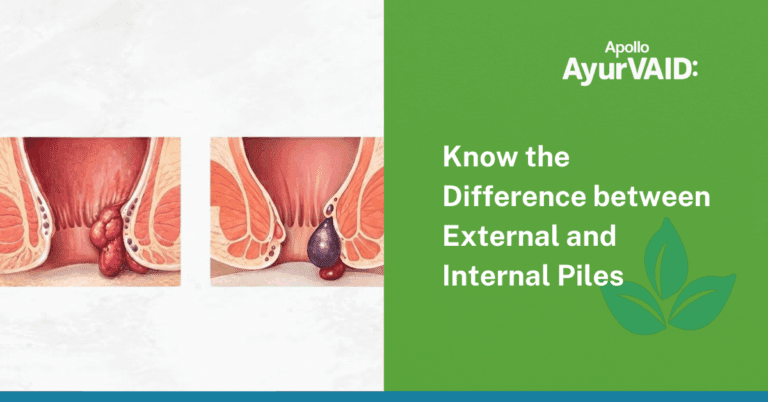Eczema, or “Vicharchika,” is a common skin condition characterised by dry, itchy skin with rashes along with bumps, redness, discharge, and discolouration as well. While contemporary medicine views eczema as a non-contagious inflammation of the skin resulting from allergies, irritant contact, heredity, and environmental factors, Ayurveda interprets it as caused by imbalanced Doshas, particularly Kapha, along with the involvement of skin, blood, muscles, and body fluids. An important part of treating eczema, from both angles, is dietary modifications. This blog discusses foods to avoid with eczema and foods that help eczema go away, based on insights from ancient Ayurveda knowledge and recent research.

The Ayurveda Perspective on Eczema and Diet
Ayurveda focuses on the fact that Agnimandya (defective digestion) is the root cause of most diseases, including Vicharchika. This leads to poor digestion and the creation of ‘Ama’ (toxins), which disturb the Tridoshas (Vata, Pitta, and Kapha) and cause skin problems in the body. Hence, diet and lifestyle play an important role in its management.
Foods to Avoid with Eczema (Apathya)
In Ayurveda, there are foods known as “Apathya” or unwholesome, which can intensify skin conditions such as eczema. Omitting these foods can be of great use in controlling symptoms:
- Sour and Salty Foods: Too much intake of sour foods (Amlarasa) and salty foods (Lavana rasa) is avoided since they have the potential to increase Pitta dosha, which deals with heat and inflammation, and thus increase eczema symptoms.
- Dairy Foods: Curds (Dadhi) and overindulgence in milk (Dugdha) are unwholesome, which leads to Kapha increase, causing more itching and excessive discharge.
- Oily and Heavy Foods: Foods that are heavy to digest, excessively watery (Drava ahara), or oily/fried (Snigdha ahara) will make the indigestion and imbalance of Kapha worse.
- Pungent and Corrosive Foods: Too much pepper (Maricha), particularly in the case of Pitta-induced itching, and corrosive foods (Vidahi ahara) are to be avoided. All pungent foods tend to raise Pitta.
- Specific Grains and Legumes: Too much consumption of black grams (Masha) and sesame (Tila) is not wholesome. Horse gram (Kulattha) is also included for avoidance.
- Meats: Meat of marsh-dwelling animals (Anupa mamsa) and too much fish (Matsya) are to be avoided.
- Sugars: Jaggery (Guda) and sugarcane derivatives (Ikshu Vikara) are also included in the list of unwholesome foods.
- Processed and Incompatible Foods: Processed and junk foods rich in preservatives, artificial colouring, and additives are avoided as they may cause the introduction of toxins.
Ayurveda also advises strongly against taking mutually incompatible food mixtures (Viruddha Ahara). These include:
- Certain grains should not be consumed with milk, curd, buttermilk, horsegram, black gram, and oil.
- Radish and garlic with milk.
- Continuous intake of aquatic and marshy flesh with milk
- Black pepper, Kakamachi, and Lakucha with curd and ghee
- Meat of deer with milk
- Radish with jaggery
- Excessive alcohol with milk
- Sour articles with milk
- Excessive green vegetables with milk
- Honey and meat after a hot diet, and vice versa
- Fish, lemon, and milk together
These dietary recommendations in Ayurveda focus on not only what you eat, but also how you arrange food and digest it, as poor digestion can contribute to exacerbated skin problems.
Foods that Trigger Eczema
Modern research and clinical observations largely echo some of these Ayurveda principles, identifying common foods that trigger eczema flare-ups, particularly in individuals with food allergies. These frequently include:
- Cow’s Milk: A prevalent allergen, particularly in children, that frequently improves after elimination.
- Eggs: Another common cause of eczema symptoms.
- Fish and Seafood: These can exacerbate the eczema symptoms.
- Tomatoes: May aggravate the symptoms in some.
- Soy Products: Reported to aggravate the symptoms.
- Wheat and Nuts (Peanuts and Tree Nuts): They are less commonly reported than other allergens, but wheat and nuts do cause reactions in some.
It must be remembered that dietary trigger foods are very individual, and an individualised plan, usually taking the form of elimination diets under professional guidance, is usually the best way to determine individual sensitivities.
Foods That Help Eczema Go Away (Pathya)
Ayurveda recommends Pathya, or a wholesome diet, to support the body’s healing process and reduce eczema symptoms. These foods that help eczema go away generally support healthy digestion and detoxification:
- Old Grains: Old barley (Purana yava), old wheat (Purana godhuma), and 60-day paddy or rice (Shashtika shali) are said to be beneficial.
- Green Grams (Mudga): They are easy to digest and nourishing.
- Bitter Vegetables: Bitter gourd and pointed gourd are said to be beneficial, as bitter herbs and soups made from them are useful because of their detoxifying nature.
- Lean Meats: Meat soup from animals that live in deserts and dry areas is recommended.
- Fruits: Raisins and pomegranate are wholesome. Indian gooseberry is also suitable.
- Fats: Butter and ghee are wholesome.
- Light Food: Generally, a diet consisting of light-to-digest foods is recommended to avoid indigestion and Kapha imbalance.
Modern nutritional science also points to foods that help eczema go away by reducing inflammation and supporting skin health:
- Fruits and Vegetables: They reduce eczema risk due to the presence of antioxidants, vitamins, and minerals in them.
- Omega-3 Fatty Acids: Present in fatty fish (salmon, mackerel) and flaxseeds, they reduce inflammation and enhance skin barrier function.
- Whole Grains: Brown rice and oats contain important nutrients and fibre that are beneficial for general health and skin conditions.
- Legumes and Pulses: Rich in fibre and protein, their regular consumption has been inversely related to atopic symptoms.
- Healthy Fats: Avocados and olive oil are known to nourish the skin and have an anti-inflammatory effect.
Unhealthy Habits
Besides nutrition, Ayurveda also considers certain habits and mental states to cause skin disorders, like eczema.
Physical Habits: Taking too much of a bath, excess exposure to sun or heat, forcing oneself to suppress natural urges (such as vomiting), excessive exertion, especially immediately after having a large meal, taking cold water when one is hot or exhausted, excessive eating, or eating when previous food has not been digested.
Mental State: Agitation, anger, stress, anxiety, etc., can cause the flare-ups of skin conditions, including eczema.
Sleeping Patterns: Day sleeping habits are also deemed unwholesome.
Comprehensive Ayurveda Management
While diet plays an important role, Ayurveda presents a holistic approach to eczema. This includes “Shodhana Karma” (cleansing treatments) like Vamana (induced vomiting), Virechana (induced diarrhoea), and Raktamokshana (bloodletting), which are important for treating skin problems. External application (Lepa, Parisheka, Avachurana, Avagahana, Dhuma) and internal medicines in the form of herbal compounds are used in large numbers to balance Doshas and aid healing. The treatment option, including diet and medication, always relies on the cause and the person’s unique situation.
Conclusion
Ayurveda is a very comprehensive and efficient method of treating eczema. The solution involves finding the root cause, which is usually linked to Dosha imbalances and poor digestion, and addressing it with a careful plan that includes following specific dietary guidelines (Pathya and Apathya), adopting healthy habits, and possibly undergoing cleansing treatments. By adhering to the guidelines—foods to avoid with eczema and including foods that help eczema go away—people can effectively reduce symptoms and encourage skin wellness over a long period. Consulting an Ayurveda doctor for specific guidance is always recommended for the best control.







